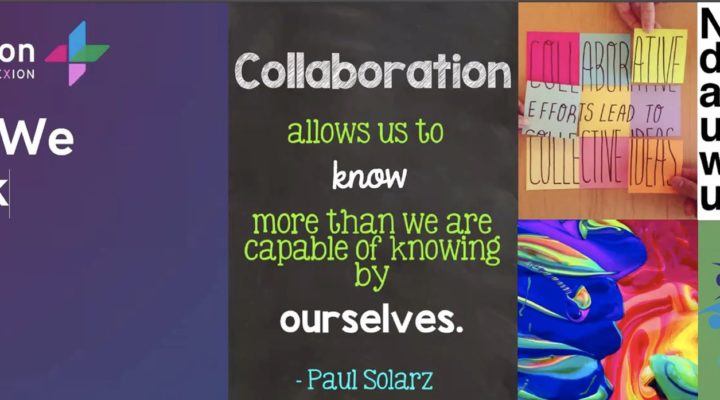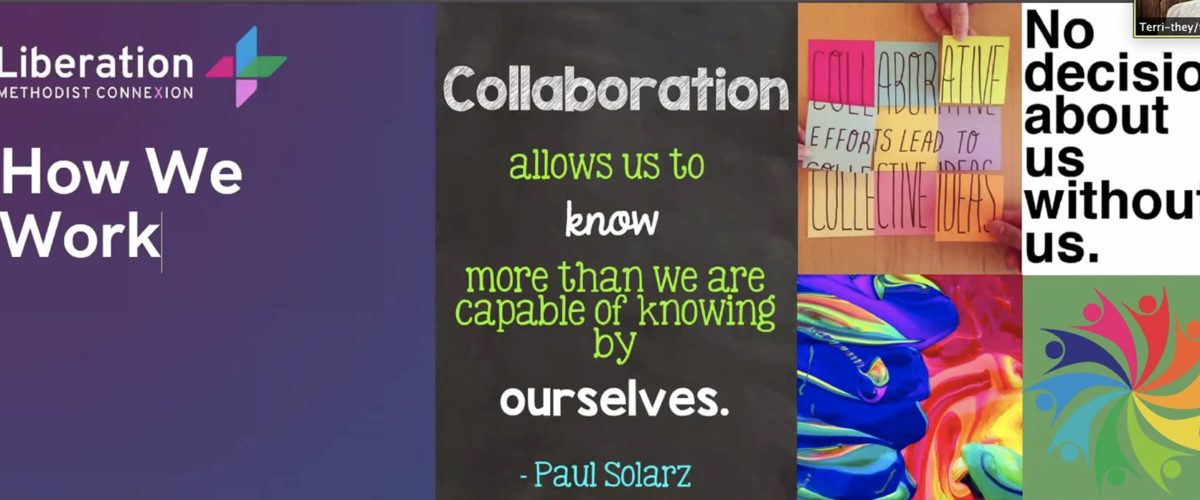Even before any formal division has been enacted, an ad hoc group of United Methodists say they’ve formed a new denomination based on “radical hospitality” for LGBTQ persons, people of color and anyone who has felt rejected by the church.
The Liberation Methodist Connexion, or LMX as it’s being called, announced its formation Nov. 29 with an online worship service, an introductory panel and an “after party” to celebrate the new denomination. The organization emerged from 18 months of discussions that began in May 2019 after the UMC’s special General Conference, its highest legislative body, sharply tightened church policies against same-sex marriage and ordaining LGBTQ persons as clergy.
Although other unofficial groups are attempting to reform The United Methodist Church from within, many see the Liberation Methodist Connexion as the final capitulation after almost half a century of wrangling over the UMC’s official policy holding homosexual practice to be “incompatible with Christian teaching.”
“LMX organizers have focused on including persons of color, economically poor people, youths and young adults, and anyone who has felt excluded by the church.”
While the LGBTQ bans enacted by the 2019 General Conference catalyzed the movement, from its first gathering LMX organizers have focused on including persons of color, economically poor people, youths and young adults, and anyone who has felt excluded by the church. Such a membership can encompass many cohorts, since The United Methodist Church, at least in the United States, demographically measures as 98% white, middle-to-upper-middle class with two-thirds of its members over age 50.
With its theology of liberation, LMX could be considered the “anti-UMC.” Fully embracing its grassroots development yet claiming heritage as John Wesley’s spiritual heirs, LMX has formed with a minimal amount of structure. According to its website, “We are journeying toward a new way of being followers of Christ that refutes the imbalance of powers, principalities and privileges that has plagued Methodism: colonialism, white supremacy, economic injustices, patriarchy, sexism, clericalism, ableism, ageism, transphobia and heteronormativity.”
Where the UMC has a tripartite governance of executive, legislative and judicial branches bound by a 900-page rule book, LMX has a 12-member “wisdom council” of leaders who collaborate on decisions. Where the UMC has a formal system of shared financial support for the denomination, LMX lists a section on “resources” in which the denomination vows “to live out fully resourced lives, sharing and caring with extravagant generosity and reciprocity.” LMX requests donations via its website.
Where the UMC has 13 official seminaries and 40 approved seminaries including Harvard and Yale, LMX currently has no program for training and accrediting clergy. Instead it offers a “pastoral care” objective “embodying a justice-centered, liberating future, pastoral care in the LMX holds a vision for shared community care through mutual love and truth-telling, for care with one another, where the spiritual gifts of those who offer care are affirmed and received.”
Many of LMX’s organizers are United Methodist clergy under 50 and/or clergypersons of color.
“Theologically, LMX has started with a fluid vision.”
Theologically, LMX has started with a fluid vision that goes beyond even the “process theology” trend of the late 20th century. Instead of developing a system of beliefs such as those in the UMC’s foundational documents, LMX leaders say its theology is “not written in stone because our human understanding continues to evolve as we deepen our personal and collective understandings of God. We have been expanding our Methodist theological heritage with various expressions of Liberation theologies, theories and praxis. God remains infinitely gracious, creative, merciful and engaged with creation, healing and redeeming the world.”
To put these lofty aspirations into more everyday terms, LMX seems to be taking its cue from adventurous archaeologist Indiana Jones in Raiders of the Lost Ark: they’re making it up as they go along. LMX collaborators say there’s solid biblical precedent for how the new denomination is proceeding — the founding of the church on Pentecost as described in Acts 2.
No tongues of fire or descending doves were visible during the live-streamed introduction of the Liberation Methodist Connexion, but talk of being led by God’s Holy Spirit abounded. (Ironically, the online event could have used some divine intervention as many of the 400 people registered were unable to participate because of technical problems). Althea Spencer-Miller, New Testament professor at UMC-related Drew Theological School in Madison, N.J., told UM News: “The timeline of the Holy Spirit is driving our decision to launch the LMX at this moment, and we are following her call.”
“LMX plans no litmus test of beliefs for its participants.”
While LMX lists some 40 collaborators as founders, LMX leaders declined thus far to say how many individuals or congregations are participating, wanting to emphasize inherent worth and not numerical power. LMX collaborators say they won’t require anyone to leave The United Methodist Church, or any other church, in order to participate in the new denomination. Unlike the conservative Wesleyan Covenant Association, which has a strict set of rules required of its members, LMX plans no litmus test of beliefs for its participants. Instead, LMX leaders say they want to focus on actions, not beliefs.
Although LMX leaders promised to post a recording of the launch event, as of Dec. 8 there was no video on YouTube, Vimeo or the LMX website. The denomination plans to hold a New Year’s Eve online vigil as its next event. Details will be announced on the LMX website.
Cynthia B. Astle is a veteran journalist who has covered the worldwide United Methodist Church at all levels for more than 30 years. She serves as editor of United Methodist Insight, an online journal she founded in 2011.
This story was made possible by gifts to the Mark Wingfield Fund for Interpretive Journalism.


